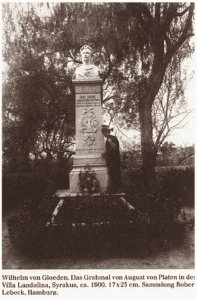Nicolas Roberto Robles
Bandajoz, Spain

Weil da, wo Schönheit waltet, Liebe waltet
Because where beauty reigns, love reigns
– Sonette aus Venedig.
August von Platen was a German poet whose death inspired Thomas Mann to write Death in Venice. Descended from an impoverished noble family, he attended the Cadet School at Munich from ages ten to fourteen. Later he became interested in foreign languages and began to write verses. In 1813, he reported for military service and briefly took part in the 1815 campaign against Napoleon. In 1818, he entered the University of Würzburg, turned to Persian language and literature, and after 1819 devoted himself to poetry. In 1824 he took his first trip to Italy. He became fascinated by Venice and a year later wrote Sonnets from Venice.
Venedig liegt nur noch im Land der Träume
Und wirft nur Schatten her aus alten Tagen . . .
Venice lies only in the land of dreams,
And only casts shadows from days of old . . .
In 1825, he wrote his best-known poem, “Tristan,” about the experience of beauty, the nearness of death, and the eternal pain of love. He then returned to Germany, where he was taken into custody for having exceeded his leave for study purposes and going to Venice instead.

In the summer of 1826, Platen received permission from the military authorities to spend two years studying in Italy. In 1827, Heinrich Heine published mocking verses by Karl Immermann, which Platen felt provoked by. He then denigrated Heine because of the latter’s Jewish origins. Heine took revenge by making Platen’s homosexuality public. The mutual attacks, presented through literary means, led to a lifelong enmity between the poets. Platen remained permanently in his Italian exile, changing his residence several times between Rome and Naples. Most of the time, however, he was lonely and dissatisfied. Except for two brief visits, he never saw his homeland again.
In 1829 a cholera pandemic reached Russia and from there progressed into Europe. It reached Vienna and Berlin in August 1831, spread over the greater part of France, and by 1835 had progressed to Italy. Platen fled cholera from Naples to Palermo and then on to Syracuse, where he planned to spend the winter studying history. There, alcoholic, Platen suffered what he thought was a cholera symptom, colic, and died, 39 years old, possibly from excessive medication.1 The Marchese Landolina di Sant’Alfano had him buried on December 6, 1835, in the garden of Villa Landolina, near Syracuse, as there were no Protestant cemeteries in Sicily.

The death of Platen inspired Thomas Mann to write Der Tod in Venedig (Death in Venice). It is the story of Gustav von Aschenbach (Platen was born in Ansbach), a famous writer of just over fifty and long widowed, who has set his life entirely on performance. The opera of Benjamin Britten Death in Venice is based on this short novel, as well as the film of the same title directed by Luchino Visconti, but the Italian director transformed von Aschenbach into a music composer. The novel contains autobiographical elements, since the German writer, staying for a week in 1911 (with his wife and his brother Heinrich) at the Hotel des Bains on the Venetian Lido, the main setting of the action, met there a beautiful boy who captivated and inspired him. Mann, who defended Platen in an essay published in 1930 against Goethe, liked to quote Platen’s poem “Tristan” which begins with these lines:
Wer die Schönheit angeschaut mit Augen,
Ist dem Tode schon anheimgegeben,
Wird für keinen Dienst auf Erden taugen,
Und doch wird er vor dem Tode beben,
Wer die Schönheit angeschaut mit Augen!
He who with his eyes has seen beauty,
Is already given over to death,
Will not be fit for any service on earth,
And yet tremble in the face of death,
He who with his eyes has seen beauty!
End note
- Daniela Hippeli: Liebe und Verzweiflung. August Graf von Platen. In: Auf den Spuren der Dichter in Würzburg / hrsg. Von Kurt Illing. – Würzburg. Eigenverlag, 1992.
NICOLAS ROBERTO ROBLES is Professor of Nephrology at University of Extremadura and Member of the Academy of Medicine.
